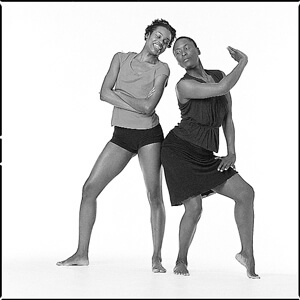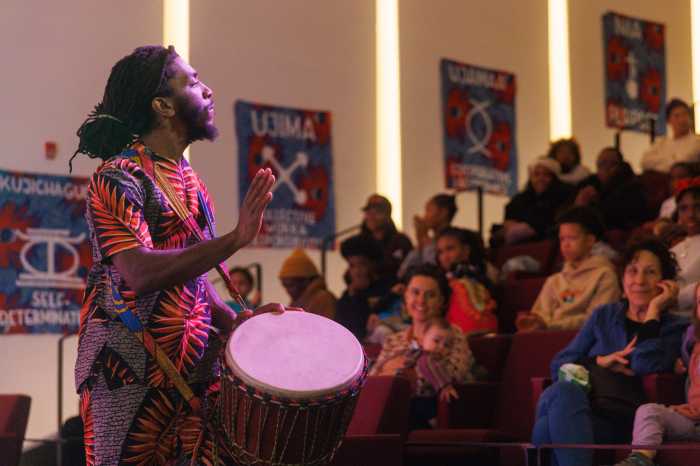Urban Bush Women offers response to dehumanization of Africans
“Give Your Hands to Struggle,” a solo choreographed by Jawole Willa Jo Zollar of the Urban Bush Women, is set to a poem by Bernice Johnson Reagon. The poem is virtually a catalogue of luminaries in African-American history that includes Frederick Douglas, Sojourner Truth and the three ’6os civil-rights workers who were shot to death and buried in a red-clay dam in 1964—James Chaney, Andrew Goodman and Michael Schwerner.
On June 25, the next to last day of the run, Rhea Johnson performed this excerpt from the 1998 “Hands Singing Song.” It introduced the Urban Bush Women’s 20th anniversary program at the Joyce, and encapsulates the Bush strategy—hands and bodies sing, affirming identity and humanity.
One of this year’s creations was by Bridget L. Moore, the winner of UBW’s first Project Next Generation commission. “Sacred Vessel” is promising. The spectacular Urban Bush Women wear natural colored, loose fitting costumes, each different. They dance to the exiled Algerian vocalist Abdelli’s fusion “Svar,” then to the more Africanist beat of Eric Cassilas’ “Ya-Ta-Hey.”
The piece owes much stylistically to choreographer Ron Brown—Moore is a member of his troupe Evidence—but she expands on the feminine attributes in its softness, roundness and fluidity. Nia Eubanks spins naturally up from the floor and, as if possessed, initiates movement in the others. Her dance harmonizes with the rest moving in unison. Hands scoop or gather low to the ground. It seems the body is the sacred vessel. Dancers, sitting or kneeling, double over as if to vomit. In an eloquent duet, Maria Bauman inserts her arms under Amara Tabor-Smith’s from behind and they move together. It ends with Bauman raising her arm to the heavens in a sort of triumphant reverence.
Moore’s language is beguiling and the music and movement viscerally fulfilling, even if her gestures do not always clearly express her story.
“Girlfriends” (1986) was performed by founding members Christine King and Zollar with neophytes Christal Brown and Nora Chipaumire. In this send-up of girl bonding, Zollar entertains us in a pink fur-trimmed teddy, and hilariously pouts when stage friends and audience laugh.
Call them batty, booty, buttocks or buns, “Batty Moves” is the company’s affirmation of that specific part of the anatomy. These women shake theirs, artfully covered with half skirts decorated with the company logo. The dancers proudly gyrate—but without the pandering seen on MTV, in hip-hop or burlesque. Intriguing solos include an energetic Brown taking flight propelled by the percussive score. In her brief introduction to “Batty Moves,” Zollar reminds us that in the early 19th century, the ample rear of South African Sarah Bartman earned her the cruel moniker “Venus of Hottentot” and she was exhibited throughout Europe as an example of racial inferiority.
Times have changed a bit, but Zollar’s mission necessarily continues. She brings us the words of dance pioneer Pearl Primus in her “Walking With Pearl—Africa Diaries.” In unpublished journal entries like, “In the dance I have shared the inner music of mankind,” Zollar finds a voice for her own experience.
Zollar reads eloquently from Primus’ text, seated at the side of the stage while her company interprets with movement. “Nhemamusasa,” a traditional Zimbabwean song, and the music of Toumani Diabate and Battake Sissoko lend coherence to “Walking With Pearl,” which otherwise would be a docu-dance in which the group’s movements and the spoken words sometimes collide. Primus’ reference to “oceans of blood” provides a strong, provocative image that cannot easily be processed.
In “Walking With Pearl,” Zollar presents Primus’ African journey on stage. A mountainous storm is braved. This section draws on Afro-Caribbean folkloric dances that personify natural phenomena. Eubanks is a windstorm causing everyone to shake. Chipaumire is the mango tree that is gnarled with anger. She extends a flat foot toward us, showing the African red clay earth that sticks to it. In these powerful images, Zollar’s unique interface of words, movement and music brings Primus’s empowering words into life-like view.
“Dance is the fist with which I fight prejudice” is the towering legacy Zollar carries.
Fidel Garcia and Andrea Long dance with Fugate/Bahiri Ballet NY, which will be joined next week by John-Mark Owen.
gaycitynews.com


































